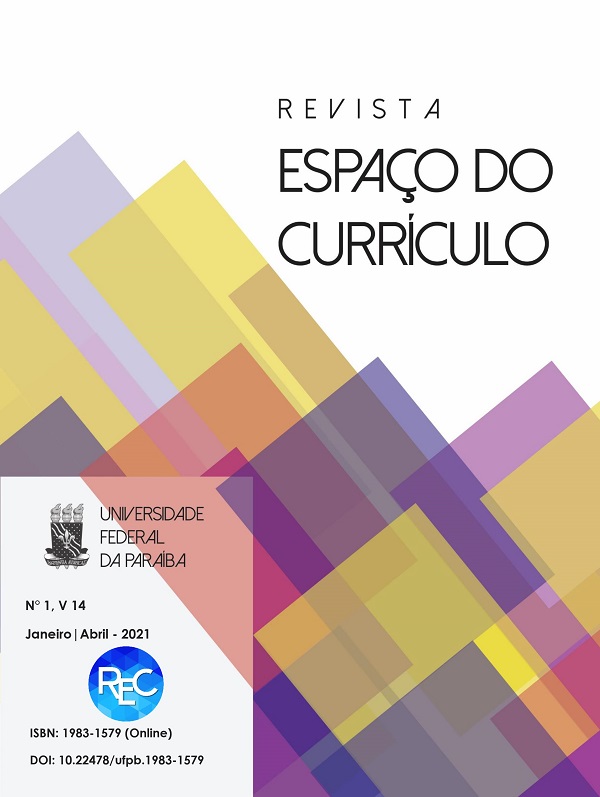PEDAGOGY OF RUPTURE
occupying the margins of remote teaching for pedagogic-curricular dynamization
DOI:
https://doi.org/10.22478/ufpb.1983-1579.2021v14n1.56411Keywords:
Remote Teaching, Pandemic, Didactics, CurriculumAbstract
The text consists of a reflective essay structured by questions about the scenario of pedagogical practices inaugurated by remote education. The contradictions of the implementation of remote education are critically explored, considering, on the one hand, its condition as a possible strategy for educational action in the context of the pandemic, and, on the other hand, the risks arising from the reinforcement of a individualizing, prescriptive and standardized pedagogical-curricular approach. Assumptions of pedagogical assumptions are pointed out, based on the belief that the school social function and school learning are not reduced to the individual performance of students in scheduled tasks and that the teaching mediation requires building an atmosphere of interaction, collaboration and critical thinking. The legitimacy of the school is advocated as a space for the formation of plural sociability that demands presence as a learning device.
Downloads
Metrics
References
ARROYO, Miguel. Currículo: território em disputa. Petrópolis: vozes, 2011.
FRANCO, Maria Amélia Santoro. Pedagogia e prática docente. São Paulo: Cortez, 2012.
FREIRE, Paulo. Educação como prática da liberdade. 42. ed. Rio de Janeiro; São Paulo: Paz e Terra, 2018.
IMBERNÓN, Francisco. Qualidade do ensino e formação do professorado: uma mudança necessária. São Paulo: Cortez, 2016.
LIBÂNEO, José Carlos. Politicas educacionais no Brasil: desfiguramento da escola e do conhecimento escolar. Cadernos de Pesquisa, v. 46, p. 38-62, 2016. Disponível em: https://www.scielo.br/pdf/cp/v46n159/1980-5314-cp-46-159-00038.pdf
LUCERO, María Margarita. Entre el trabajo colaborativo y el aprendizaje colaborativo. Revista Iberoamericana de Educación. Vol. 33, n. 1, 2003, p. 1-21. Disponível em: https://doi.org/10.35362/rie3312923
MARTINS, Letícia Martins de; RIBEIRO, José Luis Duarte. Engajamento do estudante no ensino superior como indicador de avaliação. Avaliação, Campinas, vol.22 no.1 Sorocaba Jan./Apr. 2017. Disponível em: https://doi.org/10.1590/s1414-40772017000100012
PIMENTA, S. G. As ondas críticas da didática em movimento: resistência ao tecnicismo/neotecnicismo neoliberal. In: SILVA, M.; NASCIMENTO, O. C.; ZEN, G. C. (orgs.). Didática: abordagens teóricas contemporâneas. Salvador: EDUFBA, 2019. p. 19-64.
PIMENTA, S. G. Para uma re-significação da didática – ciências da educação, pedagogia e didática (uma revisão conceitual e uma síntese provisória). In: PIMENTA, S. G. (org.). Didática e formação de professores: percursos e perspectivas no Brasil e em Portugal. 3. ed. São Paulo: Cortez, 2010. p. 23-87.
SCHMIED-KOWARZIK, W. Pedagogia dialética: de Aristóteles a Paulo Freire. São Paulo: Brasiliense, 1988.
SOUSA SANTOS, Boaventura de Sousa. A cruel pedagogia do vírus. Coimbra: Edições Almedina, 2020.
TORRES SANTOMÉ, Jurjo. Currículo escolar e justiça social: o cavalo de Troia da educação. Porto Alegre: Penso, 2013.
Downloads
Published
How to Cite
Issue
Section
License
Copyright (c) 2021 Curriculum Space Journal

This work is licensed under a Creative Commons Attribution 4.0 International License.
By submitting an article to Curriculum Space Journal (CSJ) and having it approved, the authors agree to assign, without remuneration, the following rights to Curriculum Space Journal: first publication rights and permission for CSJ to redistribute this article. article and its metadata to the indexing and reference services that its editors deem appropriate.
















